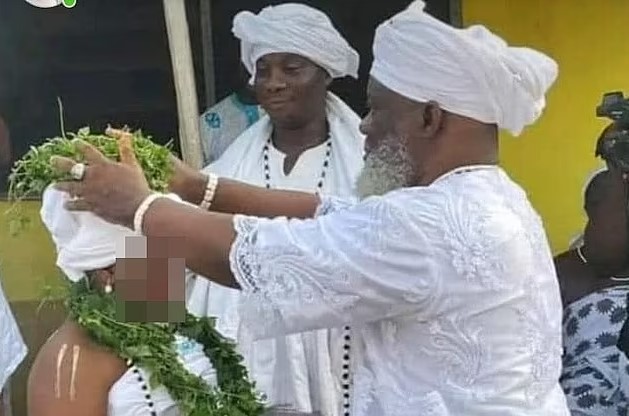Chieftaincy Ministry probes 63-year-old Ga priest’s marriage to 12-year-old minor
The Ministry of Chieftaincy and Religious Affairs has initiated a probe into the recent marriage between a 63-year-old traditional priest in Nungua, Gborbu Wulomo, Nuumo Borketey Laweh XXXIII and a 12-year-old girl.
Marriage or informal union in which one or both of parties involved are below the age of 18 is considered a child marriage.
Child marriage is illegal in Ghana – both the 1992 Constitution and the 1998 Children’s Act set the legal age for marriage at 18 for both girls and boys.
Speaking in a media interview, the sector minister, Stephen Amoah Boateng, pledged to investigate the matter for his outfit to understand the issue and take necessary measures since the bride, Naa Ayemoede, is a minor.
“I’m still doing a lot more checks through the traditional authority and the police command on the ground because we are talking about a minor here. We are also trying to reach the family of the 12-year-old.
“It is not clear what is happening there, and I want to get to the bottom of it,” he said in an interview.
On March 30, a video of the customary marriage between the Gborbu Wulomo and the adolescent girl, Naa Okromo, in Nungua sparked a wave of debate and concern, shedding light on age disparities and traditional practices within the community.
In a ceremony steeped in tradition, the 63-year-old Gborbu Wulomo entered into matrimony with Naa Okromo, who has now taken on the traditional name Naa Ayemoede as per customary marriage protocols prevailing in their community.
However, the marriage is not deemed complete until Naa Ayemoede undergoes a subsequent ceremonial purification ritual.
This purification ceremony is deemed essential to prepare her for the responsibilities incumbent upon her as the spouse of the Gborbu Wulomo, which notably includes the significant role of bearing children in accordance with tradition.
Furthermore, in alignment with customs, the Gborbu Wulomo must select a customary wife referred to as ‘Boi Ekpaa Yoo’ or his ‘Sɛiheyoo’.
This revered tradition is essential to the Gborbu Wulomo’s lifelong tenure and authority over ceremonial affairs within the community.



